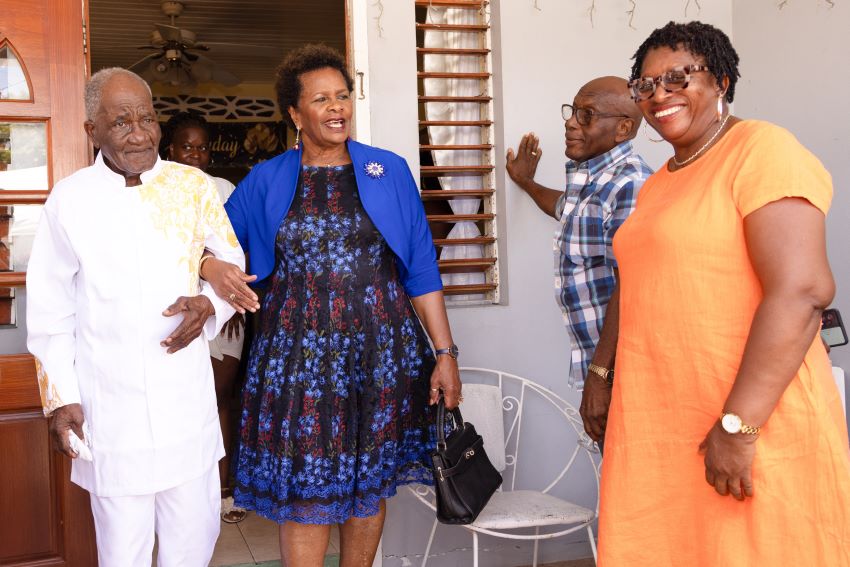“Trust God first” is the mantra of one of Barbados’ newest centenarians, Athelstan Browne, who celebrated his 100th birthday on April 29, 2025, at his home in Montrose, Christ Church, surrounded by family and friends.
One of his specially invited guests was President of Barbados, Her Excellency, The Most Honourable Dame Sandra Mason.
Mr. Browne shared that he grew up “not knowing a mummy” as his mother passed away at age 23, when he was two years old, and his brother was only one year old.
Crediting his grandmother for his upbringing, Mr. Brown remarked: “I had a real good, good grandmother that raised two of us, and everything we learn before we went to school, she taught us.”
Pointing to a humble yet deeply religious upbringing, Mr. Browne said: “I and my brother slept on the floor. Our grandmother spread things down there, and she just put the pillow under our head.”
He recalled that they had to sing the hymn “Under the Blood” before going to bed, and first thing in the morning before they had breakfast, which usually consisted of “a cup of tea and two biscuits”. Adding that the hymn was “our song”, Mr. Browne sang the hymn from memory.
Stressing that his grandmother was a great provider, he noted: “My grandmother had land, and she would work the land…. We would eat raw potato, raw okras, (green) peas, cucumbers…. The only thing we did not eat was raw yams and eddoes.”
Mr. Browne continues to enjoy his ground provisions “with a little rice”, as he likes his rice with green peas, and if available, chicken boiled with the rice. “I am a fish man,” he remarked, eating it either fried or with a “stew sauce”.
Continuing to nurture his Christian beliefs, he joined the Mount Ararat United Holy Church (currently in Dayrell’s Road, Christ Church) in 1967, at age 33, and has continued there ever since.
Once the Superintendent of the Sunday School at the church, Mr. Browne is still instrumental in providing leadership to the youth there. “I have a crowd of young people at church that love me…especially when I have to talk to them…. It is what they should hear and what they should have,” he said.
The centenarian was raised in Montrose, Christ Church, and attended the Christ Church Boys’ School (now Milton Lynch Primary School). After leaving school, Mr. Browne initially took to agriculture but then worked cutting soft stone in two quarries in Christ Church.
In 1947, at the age of 22, he decided to join the US Farm Labour Programme and took the first Pan American Airlines flight out of Barbados. Over 10 years later, Mr. Browne returned to Barbados and married Monica Browne (deceased). Together, they built the house where he currently resides.
Returning to his roots in agriculture, the centenarian worked at the Ridge Plantation, Christ Church, until retirement. He also planted and reaped ground produce at home, as well as planted and cut canes.
Mr. Browne, who is generally in good health and has a sharp memory, still works around the home and enjoys reading, which he does without glasses. He also keeps in touch with his family in New York and North Carolina, and will do some travelling, but he is always ready to return home.
After toasting the centenarian, Her Excellency remarked: “You are in the midst of a lot of love, and I am sure you are going to enjoy the rest of your birthday. I am really happy to have met you. I am grateful for the work that you still continue to do with our young people because a lot of them lack direction, and we, nowadays, don’t take enough time to sit down and speak with them…. We don’t remind them that they are important, that they are somebody.”
Mr. Browne responded: “You got to make them understand what … the Lord expects of them… We have to acknowledge the Lord.”
Mr. Browne has two children, 10 grandchildren, 11 great-grandchildren and two great-great-grandchildren. (PR/GIS)
Caption: President of Barbados, Her Excellency, The Most Honourable Dame Sandra Mason, and Barbados’ newest centenarian Athelstan Browne take a walk outside during his birthday celebrations in Montrose, Christ Church

 Government1 week ago
Government1 week ago
 Sports3 weeks ago
Sports3 weeks ago
 Business4 weeks ago
Business4 weeks ago
 Religion3 weeks ago
Religion3 weeks ago
 Business3 weeks ago
Business3 weeks ago
 Sports2 weeks ago
Sports2 weeks ago
 Government2 weeks ago
Government2 weeks ago
 International2 weeks ago
International2 weeks ago





































